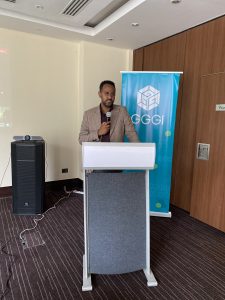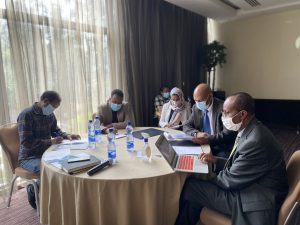Thursday, June 24, 2021 – The Global Green Growth Institute (GGGI) Ethiopia convened a half-day inception workshop on the Ethiopia Bus Rapid Transport-BRT B2 Line E-Mobility Project at Radisson Blu Hotel in Addis Ababa, Ethiopia. A total of 20 participants, including directors, technical government officials, and a range of stakeholder institutions attended the workshop. Technical experts from the GGGI headquarters joined virtually to present the draft study and engage in discussions with the stakeholders in Addis Ababa. The objective of the workshop was to conduct multi-stakeholder consultations and collect inputs on the pre-feasibility study that is ongoing by GGGI HQ technical experts and the country program.
The Government of Ethiopia (GoE) committed to implement a bus rapid transit (BRT) system that delivers fast, comfortable, and cost-effective services at metro-level capacities to address increased congestion, greenhouse gas emissions, incidence of road accidents and deteriorating local air quality in the capital city of Addis Ababa. The project’s initial route will develop long bus lanes with a dedicated corridor. The BRT project has already closed financing through securing a sovereign concessional loan from the French Development Agency (AFD), which covers infrastructure including the required interchanges and traffic management systems, as well as shelters. With this background and following a Memorandum of Understanding signed between GGGI and AFD to strengthen their cooperation in assisting developing countries with the implementation of green growth policies and strategies, GGGI and AFD agreed that GGGI would undertake a pre-feasibility study report. The pre-feasibility study will assess the financial and economic opportunity of shifting the baseline choice of vehicles from diesel Euro II/III emissions standard to low-carbon buses. The conclusions of the study will serve to support GoE’s decision-making for future BRT routes.
Dr. Gemedo Dalle, country representative for GGGI Ethiopia, in his opening remarks of the workshop, pointed out that sustainable transport has been one of the focus areas of interventions for GGGI since its inception and GGGI plans to support Ethiopia in the transition of its transport sector to sustainable modes, including low-carbon mobility and non-motorized transportation. He further explained that sustainable transport and E-Mobility align with GGGI’s objectives of scaling up existing electric mobility initiatives, including delivering policy advice to projects and programs in countries; conducting sector assessments, assessing technology options where relevant; identifying and conceptualizing sustainable project models. Mr. Fitsumberhan Tsegaye, Advisor to the Minister Transport of Ethiopia, in his keynote speech remark, highlighted Ethiopia’s transport policies that are focused on greening the sector and the ongoing efforts in the ministry to boost green mobility options in Addis Ababa. He informed the participants on the recently established steering committee dedicated for e-mobility by the Ministry of Transport and other stakeholders. He indicated that the Steering Committee is going to meet every month and the importance of such platforms for the sector, explained that the platform is important to exchange information in the sector and to avoid duplication of efforts by various stakeholders as well as become a platform for more innovative interventions to reduce the carbon footprint of the sector.
pointed out that sustainable transport has been one of the focus areas of interventions for GGGI since its inception and GGGI plans to support Ethiopia in the transition of its transport sector to sustainable modes, including low-carbon mobility and non-motorized transportation. He further explained that sustainable transport and E-Mobility align with GGGI’s objectives of scaling up existing electric mobility initiatives, including delivering policy advice to projects and programs in countries; conducting sector assessments, assessing technology options where relevant; identifying and conceptualizing sustainable project models. Mr. Fitsumberhan Tsegaye, Advisor to the Minister Transport of Ethiopia, in his keynote speech remark, highlighted Ethiopia’s transport policies that are focused on greening the sector and the ongoing efforts in the ministry to boost green mobility options in Addis Ababa. He informed the participants on the recently established steering committee dedicated for e-mobility by the Ministry of Transport and other stakeholders. He indicated that the Steering Committee is going to meet every month and the importance of such platforms for the sector, explained that the platform is important to exchange information in the sector and to avoid duplication of efforts by various stakeholders as well as become a platform for more innovative interventions to reduce the carbon footprint of the sector.
 Technical experts from GGGI headquarters in South Korea made a presentation of the project study areas to the stakeholders during the workshop. In his presentation, Dr. Chang Sun Jang, Sustainable Mobility & Transport lead at GGGI, informed the participants on how the implementation of pre-feasibility study will enable a bus rapid transit (BRT) system that delivers fast, comfortable, and cost-effective services at metro-level capacities to address increased congestion, greenhouse gas emissions, the incidence of road accidents and deteriorating local air quality in the capital city of Addis Ababa. Eileen Hur, Associate in the GGGI HQ, presented the outline of the pre-feasibility study, indicating that the feasibility study will be using local data as much as possible and where there is a gap it will consult the available international data from other institution studies. After data collection, impact assessment is going to be analysed for the BRT B2 line and the study will recommend implementation strategies for the BRT B2 line. Three low carbon options are considered for the bus type selection i.e, diesel hybrid vehicles, Plug-in hybrid vehicles, Battery electric vehicles (with standard overnight charging option). Two possible scenarios with the above vehicle options are going to be discussed in detail in the study. Financial, economic as well as environmental impacts will be discussed and presented in the pre-feasibility study to present the best option for the implementation of the BRT B2 line.
Technical experts from GGGI headquarters in South Korea made a presentation of the project study areas to the stakeholders during the workshop. In his presentation, Dr. Chang Sun Jang, Sustainable Mobility & Transport lead at GGGI, informed the participants on how the implementation of pre-feasibility study will enable a bus rapid transit (BRT) system that delivers fast, comfortable, and cost-effective services at metro-level capacities to address increased congestion, greenhouse gas emissions, the incidence of road accidents and deteriorating local air quality in the capital city of Addis Ababa. Eileen Hur, Associate in the GGGI HQ, presented the outline of the pre-feasibility study, indicating that the feasibility study will be using local data as much as possible and where there is a gap it will consult the available international data from other institution studies. After data collection, impact assessment is going to be analysed for the BRT B2 line and the study will recommend implementation strategies for the BRT B2 line. Three low carbon options are considered for the bus type selection i.e, diesel hybrid vehicles, Plug-in hybrid vehicles, Battery electric vehicles (with standard overnight charging option). Two possible scenarios with the above vehicle options are going to be discussed in detail in the study. Financial, economic as well as environmental impacts will be discussed and presented in the pre-feasibility study to present the best option for the implementation of the BRT B2 line.

A panel discussion was then held with key stakeholders including, Fitsumberhan Tsegaye technical advisor to Minister of Transport Ethiopia, Fesseha Fantahun, Team leader BRT Addis Ababa Beaurau of Transport, Gosaye Mengiste, Energy Advisor to Minister of Water, Irrigation and Electricity of Ethiopia, Kokeb Misrak, Director at Ministry of Finance of Ethiopia, and Iman Abubeker, Urban Mobility Project Manager at World Resource Institute. The outcome of the panel discussion showed the commitment and great effort the various ministries have shown to lay the foundation work for greening the transport sector and facilitate public transport. The Ministry of Transport Ethiopia has launched a Ten-Year transport sector perspective plan in 2020 that outlines yearly targets to achieve a zero-carbon emissions goal in the sector. Following this strategy, initial work is underway and implemented through some regulatory frameworks and policies to realize this perspective plan and noted that there could be specific regulations and policies that are yet to be developed and this will be achieved in collaboration with all actors involved. There is also an effort to open doors and minimize barriers for investment in the country with the Ministry of Finance to attract the investment needed to shift from conventional to low carbon or electric transport options with a special emphasis on public transport. The Public-Private Partnership is one key method that is identified and being incentivized by the Ministry of Finance. Fesseha from Addis Ababa Bureau for Transport added that strategies are being developed with a special emphasis to promote e-mobility and some are already enacted and have been launched for the city. Battery disposal and waste management was one concern that is raised by the participants to the panel and Dr. Chang emphasized the importance of waste management when considering e-mobility battery systems. It was indicated that the battery disposal mechanism will also be discussed in detail in the pre-feasibility study of the BRT B2 line study conducted by GGGI. The discussion also revealed that WRI, C40, GGGI, AFD are amongst the institutions that are conducting different studies to contribute to the e-mobility aspect of the transport strategy. The Ministry of Transport is currently consolidating such studies to summarize and use the findings of the studies in policy recommendations, strategies, etc. The newly formed e-mobility steering committee will be playing a major role in this regard and ensure that all relevant partners are onboard in tackling the issue of e-mobility.
As a concluding remark, it was noted that the holistic view approach is important to the finalization of the pre-feasibility/feasibility study for the BRT B2 line. Therefore, the study will look into all aspects, political commitment, policy, technology as well as the financial, investment and economic aspects that can be applied in Addis Ababa to realize and implement the e-mobility buses on the ground. Facilitating the on-ground implementation of this project will contribute to the targets of the transport sector ten-year perspective plan, GGGI 2030 strategy targets as well as the global targets in the SDG.